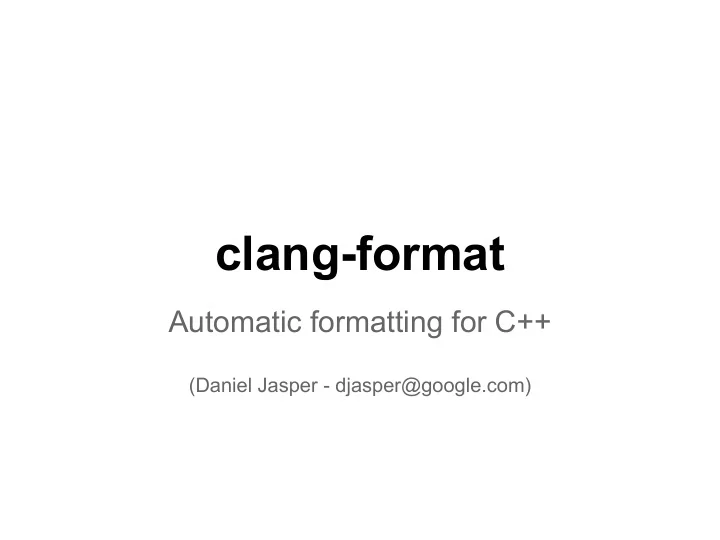

clang-format Automatic formatting for C++ (Daniel Jasper - djasper@google.com)
Why? ● A consistent coding style is important ● Formatting is tedious ○ Clang's source files contain ~25% whitespace characters Sema::NameClassification Sema::ClassifyName(Scope *S, CXXScopeSpec &SS, IdentifierInfo *&Name, SourceLocation NameLoc, const Token &NextToken, bool IsAddressOfOperand, CorrectionCandidateCallback *CCC) { }
Why? ● A consistent coding style is important ● Formatting is tedious ○ Clang's source files contain ~25% whitespace characters Sema::NameClassification Sema::Classify SomeName(Scope *S, CXXScopeSpec &SS, IdentifierInfo *&Name, SourceLocation NameLoc, const Token &NextToken, bool IsAddressOfOperand, CorrectionCandidateCallback *C CC) { }
Why? ● Time wasted on style discussions, e.g. in code reviews ● From cfe-commits@: > ... > ... > + while( TemplateParameterDepth <= MemberTemplateDepth ) Space after "while", no spaces immediately inside parens. ... ...
Why? ● Source code becomes machine editable ○ Fully automated refactoring tools! ○ Example: tools/extra/cpp11-migrate for ( int i = 0; i < N; ++i) { sum += arr[i]; } for ( auto & elem : arr) { sum += elem; }
Why? ● Source code becomes machine editable ○ Fully automated refactoring tools! ○ Example: tools/extra/cpp11-migrate for ( int i = 0; i < N; ++i) { sum += arr[i]; } for ( auto & elem : arr) { sum += elem; }
Process ● Design document ● Feedback on cfe-dev@ ● Key ideas / questions: ○ Indentation as well as line breaking ○ Editor integration and library for other tools ○ Only changing whitespaces ○ Parser vs. lexer ○ Style deduction ● Actual solutions might differ :-)
How? ● Build upon Clang component ○ Lexer: C++ token stream ○ Parser: Syntax tree #define TYPE(Class, Parent) \ case Type::Class: { \ const Class##Type *ty = cast<Class##Type>(split.Ty); \ if (!ty->isSugared()) \ goto done; \ next = ty->desugar(); \ break ; \ }
Architecture ● Structural parser: Unwrapped lines ● Layouter: Arrange tokens void f(int a){ ... void f(int a){ int * i; int * i; structural f ( ); parser f ( ); } token } annotator * : pointer void f( void f( int a) { int a) { layouter int *i; int *i; f(); } f(); }
Unwrapped lines ● Everything we'd like to put on a single line ● One unwrapped line does not influence other unwrapped lines line 1 void f() { someFunction(Parameter1, line 2 #define A Parameter2 A); line 3 } line 4
Layouter ● Every line break has a certain penalty aaaaaaaa(aaaaaaaaaaaaa, aaaaaaaaaaaaaaa(aaaaaaaaaaaaaaaaaaaaaaaaaaaaa( Penalty: 100 aaaaaaaaaaaaaaaaaaaaaaaaaaaaaaaaaaaaaaa)), Penalty: 41 aaaaaaaa(aaaaaaaaaaaaaaaaaaaaaaaaaaaaaaaa( Penalty: 100 aaaaaaaaaaaaaaaaaaaaaaaaaaaaaaaaaaaaaaaaaaaaaaaaaaaaa))); Total: 241 ● Factors ○ Nesting level ○ Token types ○ Operator precedence ○ ... ● Best formatting: Formatting with lowest penalty
Layouter ● Try "all" the combinations ● Clang-format can split or not split at each token int x = a + b + c + d + e + f + g; ^ ^ ^ ^ ^ ^ ^ ^ ● 2 8 = 256 combinations ● Memoization using an "indent state" ○ Consumed n Tokens ○ Currently in column m ○ ... ● Find cheapest state-path with Dijkstra 's algorithm
More important problems int *a; or int * a; ● Clang-format has an adaptive mode: ○ Count cases in input ○ Take majority vote
Example: for -loops ( Sema.cpp ) for (OverloadExpr::decls_iterator It = Overloads.begin(), DeclsEnd = Overloads.end(); It != DeclsEnd; ++It) {} for (SmallVectorImpl<sema::PossiblyUnreachableDiag>::iterator i = Scope->PossiblyUnreachableDiags.begin(), e = Scope->PossiblyUnreachableDiags.end(); i != e; ++i) {} for (TentativeDefinitionsType::iterator T = TentativeDefinitions.begin(ExternalSource), TEnd = TentativeDefinitions.end(); T != TEnd; ++T) {} for (Module::submodule_iterator Sub = Mod->submodule_begin(), SubEnd = Mod->submodule_end(); Sub != SubEnd; ++Sub) {}
Example: Expression indentation bool value = ((aaaaaaaaaaaaaaaaaaaaaaaaaaaaaaaaaaaaaaaaaaaaa + bbbbbbbbbbbbbbbbbbbbbbbbbbbbbbbbbbbbb + ccccccccccccccccccccccccccccccccccccc) == ((ddddddddddddddddddddddddddddddddddddddddd * eeeeeeeeeeeeeeeeeeeeeeeeeeeeeeeee) + fffffffffffffffffffffffffffffffffffff)) && ((ggggggggggggggggggggggggggggggggggggggggggggg * hhhhhhhhhhhhhhhhhhhhhhhhhhhhhhhhhhhhh) > iiiiiiiiiiiiiiiiiiiiiiiiiiiiiiiiiiiiiiiii);
Example: Expression indentation bool value = aaaaaaaaaaaaaaaaaaaaaaaaaaaaaaaaaaaaaaaaaaaaa + bbbbbbbbbbbbbbbbbbbbbbbbbbbbbbbbbbbbb + ccccccccccccccccccccccccccccccccccccc == ddddddddddddddddddddddddddddddddddddddddd * eeeeeeeeeeeeeeeeeeeeeeeeeeeeeeeee + fffffffffffffffffffffffffffffffffffff && ggggggggggggggggggggggggggggggggggggggggggggg * hhhhhhhhhhhhhhhhhhhhhhhhhhhhhhhhhhhhh > iiiiiiiiiiiiiiiiiiiiiiiiiiiiiiiiiiiiiiiii;
Example: Expression indentation bool value = aaaaaaaaaaaaaaaaaaaaaaaaaaaaaaaaaaaaaaaaaaaaa + bbbbbbbbbbbbbbbbbbbbbbbbbbbbbbbbbbbbb + ccccccccccccccccccccccccccccccccccccc == ddddddddddddddddddddddddddddddddddddddddd * eeeeeeeeeeeeeeeeeeeeeeeeeeeeeeeee + fffffffffffffffffffffffffffffffffffff && ggggggggggggggggggggggggggggggggggggggggggggg * hhhhhhhhhhhhhhhhhhhhhhhhhhhhhhhhhhhhh > iiiiiiiiiiiiiiiiiiiiiiiiiiiiiiiiiiiiiiiii;
Example: Expression indentation bool value = aaaaaaaaaaaaaaaaaaaaaaaaaaaaaaaaaaaaaaaaaaaaa + bbbbbbbbbbbbbbbbbbbbbbbbbbbbbbbbbbbbb + ccccccccccccccccccccccccccccccccccccc == ddddddddddddddddddddddddddddddddddddddddd * eeeeeeeeeeeeeeeeeeeeeeeeeeeeeeeee + fffffffffffffffffffffffffffffffffffff && ggggggggggggggggggggggggggggggggggggggggggggg * hhhhhhhhhhhhhhhhhhhhhhhhhhhhhhhhhhhhh > iiiiiiiiiiiiiiiiiiiiiiiiiiiiiiiiiiiiiiiii;
Demo time
How can you use clang-format? Integration into editors / workflows available: ● vim: clang-format.py ● emacs: clang-format.el ● diff: clang-format-diff.py All in: clang/tools/clang-format/ More to come: Eclipse, TextMate, ...
How can you use clang-format? As a library ( include/clang/Format/Format.h ): tooling::Replacements reformat (const FormatStyle &Style, Lexer &Lex, SourceManager &SourceMgr, std::vector<CharSourceRange> Ranges, DiagnosticConsumer *DiagClient = 0); ● E.g. as postprocessing for refactoring tools ● Interface can be extended
Where are we now? ● Clang-format understands most C++ / ObjC constructs ● Three style guides supported ○ LLVM / Clang ○ Google ○ Chromium ● Clang-format can format its own source code
What next? ● Bugs and formatting improvements ● Configuration (files, command-line, ...) ● More coding styles ○ Coding styles using tabs? ○ Coding styles without column limit? ● C++ 11 features (lambdas, trailing return types, ...) ● clang-tidy ○ Based on Clang's AST ○ Find and fix stuff like: "Don’t evaluate end() every time through a loop "
Thank you! clang.llvm.org/docs/ClangFormat.html
Recommend
More recommend